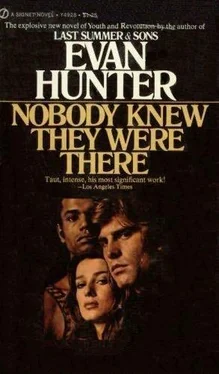Evan Hunter - Nobody Knew They Were There
Здесь есть возможность читать онлайн «Evan Hunter - Nobody Knew They Were There» весь текст электронной книги совершенно бесплатно (целиком полную версию без сокращений). В некоторых случаях можно слушать аудио, скачать через торрент в формате fb2 и присутствует краткое содержание. Город: New York, Год выпуска: 1971, ISBN: 1971, Издательство: Doubleday & Company, Жанр: Проза, на английском языке. Описание произведения, (предисловие) а так же отзывы посетителей доступны на портале библиотеки ЛибКат.
- Название:Nobody Knew They Were There
- Автор:
- Издательство:Doubleday & Company
- Жанр:
- Год:1971
- Город:New York
- ISBN:978-0094575004
- Рейтинг книги:4 / 5. Голосов: 1
-
Избранное:Добавить в избранное
- Отзывы:
-
Ваша оценка:
- 80
- 1
- 2
- 3
- 4
- 5
Nobody Knew They Were There: краткое содержание, описание и аннотация
Предлагаем к чтению аннотацию, описание, краткое содержание или предисловие (зависит от того, что написал сам автор книги «Nobody Knew They Were There»). Если вы не нашли необходимую информацию о книге — напишите в комментариях, мы постараемся отыскать её.
Nobody Knew They Were There — читать онлайн бесплатно полную книгу (весь текст) целиком
Ниже представлен текст книги, разбитый по страницам. Система сохранения места последней прочитанной страницы, позволяет с удобством читать онлайн бесплатно книгу «Nobody Knew They Were There», без необходимости каждый раз заново искать на чём Вы остановились. Поставьте закладку, и сможете в любой момент перейти на страницу, на которой закончили чтение.
Интервал:
Закладка:
“Why are you following me, Davey?” I ask.
“What’d you say?”
“I said why are you following me?”
“I don’t think I get you.”
“You get me, all right, Davey.”
“Arthur… it is Arthur, isn’t it?”
“It’s Arthur.”
“Arthur, this’s a nice Saturday night party, chance to rap a little with my friends, relax a little after a long hard week, you dig? Now I don’t want any trouble, do you? I hardly know you, man.”
“I don’t want any trouble, Davey.”
“Then don’t make any.”
“I’m going to make plenty if you don’t quit following me.”
“I don’t know what you’re talking about, man,” he says, and gets off the piano bench and walks through the crowd to where a studio couch is against the wall near the record player. A bearded young man with his right leg in a cast is sitting on the couch, his leg extended before him, his head back against the cushions as he listens to the music. There are two posters on the wall behind him, one of W. C. Fields peering over a handful of cards, the other of Lyndon Baines Johnson on a motorcycle. Davey sits down beside the boy with the broken leg, and the two immediately strike up an animated conversation. Lucille comes back from the kitchen with a bottle of beer in her hand. She looks around, smiles at me, and then goes to sit with Davey and the boy.
There are oil paintings on the wall, all of them unframed canvases, all of them very bad. A mobile made of pieces of glass wrapped in copper wire dangles from the ceiling near the window. There is a scattering of leaves on the floor, blown or dragged in from the porch outside. A Feiffer cartoon is tacked over the record player. There are books piled on top of the upright piano. A vase of pussy willows is on an end table near the easy chair in which Epstein still sits wearing the gloomy look of a Polish villager awaiting a pogrom. The voices rise in uneasy cadence. The music pierces the conversation like an electric stiletto, it is time to join the party.
Epstein wants to talk only of Paris. He is a dour man, but his pale blue eyes light up when he tells me of a lunch he had at the Pré Catelan, describing in detail each course of the meal, and then going on to tell me what his young lady had been wearing that day, referring to her as The Mademoiselle — The Mademoiselle had on yellow gloves, and she wore topaz earrings that caught the sunshine and held it trapped at each perfectly sculpted earlobe — The Mademoiselle this, The Mademoiselle that, he is something of a poet, this Epstein. Except for his wartime experience, I find it difficult to associate him with our plot. More and more, I am beginning to believe that all of it, not only Sara, is a fantasy. She is not here, is she? The fantasy ended two days ago, and she has not yet rematerialized, broken clouds cannot be reassembled. Epstein is telling me now of the afternoon he fell asleep with The Mademoiselle in the Bois, bees buzzing in the flower bed behind them, and The Mademoiselle’s hair spread on the grass, sunlight dappling her face, a true poet this Epstein. He makes me sad as hell.
I move from him into the kitchen where the man slightly older than I is still chatting with the young brunette in the floppy pink hat. There are seven or eight brown bags of garbage stacked against the wall near the refrigerator, and the man slightly older than I says to Seth Wilson, who has come into the kitchen and is helping himself to some of my scotch, I notice, calls to him where he pours liberally at the oilcloth-covered kitchen table, “Seth, what is this, a hobby or something? Collecting garbage?”
“Been too busy to take it out,” Seth says, and pours more of my scotch into a second glass, and then carries both glasses back into the living room with him.
The girl in the floppy pink hat, in a stage whisper that can be heard in Pittsburgh, says, “Who’s that over there?”
“I haven’t the foggiest notion,” the man says, and approaches me with his hand outstretched. “I'm Victor Koblenz,” he says.
“How do you do?” I answer. “I’m Arthur Sachs.”
“He’s Arthur Sachs,” Koblenz says over his shoulder to the girl, and then strokes his straggly Chinaman’s beard “This is Jean Trench,” he informs me.
“Hello, Jean,” I say.
“Hello, Arthur,” she says, and lifts her glass in greeting.
“Are you with the university?” Koblenz asks.
“No. I sell tractors. And bulldozers. Heavy machinery.”
“How fascinating,” Jean says.
“We move the earth,” I say, and smile.
“I lecture,” Koblenz says.
“On what?”
“On a platform behind a lectern,” Jean says, and smiles.
“That is very comical,” Koblenz says drily, and then goes on to tell me that he lectures on the two most import ant influences of the century, and when I ask him what those two influences might be, he says seriously, “The Beatles and Playboy magazine.”
“Victor is a trifle nuts,” Jean says.
“Victor is totally sane,” Koblenz says, and strokes his beard again. “I am sure if we had been asked to name the most important influences — oh, let us say twenty years ago, as short a time ago as that — we would unhesitatingly have named the three Jews. However…”
“Victor is also a trifle anti-Semitic,” Jean says.
“That’s a pity,” I say, “because it happens I’m Jewish.”
“I am not in the slightest anti-Semitic,” Koblenz says. “Jean is what is known in the trade as a dumb twat. I’m trying to be serious here, Jean.”
“You’re a serious old drag,” Jean says.
“I’m serious and a drag, yes, but I’m not old,” Koblenz answers. “I’m forty-seven. That’s not old”
“That’s ancient,” Jean says.
“Ignore her for the moment,” Koblenz says, and pats her on the behind. “The three Jews — Einstein, Marx, and Freud — would most certainly have been considered the most important influences on our century had it not…”
“I had three other Jews in mind,” Jean says.
“Who?”
“Roth, Bellow, and Malamud.”
“Besides being a dumb twat,” Koblenz says, “Jean is also illiterate.”
“I happen to be an English Literature graduate student,” Jean says.
“Which proves my point,” Koblenz says.
“Are you Jewish?” I ask her.
“I’m Scottish,” she says. “Which reminds me,” she adds, and lifts my scotch bottle to replenish her drink.
“At any rate,” Koblenz says, and goes on to deliver an abbreviated version of his lecture, expounding the theory that Playboy is responsible for the look of the seventies by having openly pioneered nudity in its pages, thereby paving the way for exposure of the female form in films, on the stage, in fashions, and so on. But more than that, it is equally responsible for the morals of the seventies, having convinced its male and female readers alike that fornication is quite all right and in fact sometimes desirable. Forget for the moment that it has also relegated women to the position of mere chattels….
“ I am not a mere chattel,” Jean says.
“Not only are you a mere chattel, but you enjoy being one,” Koblenz says.
“Victor is a sadist,” Jean explains.
“If you say that one more time,” Koblenz warns without a trace of a smile, “I’ll beat you senseless.”
Jean shrugs somewhat apologetically. I notice for the first time that there is a faint bruise on her cheek. I look at Koblenz with sudden loathing and barely listen as he goes on about the Beatles who, he maintains, while partially responsible for today’s look —the long hair, the costume-like apparrel — are solely responsible for today’s sound, the very sound emanating from the record player in the other room, which sound has in turn contributed to the entire psychedelic experience and hastened the widespread use of drugs.
Читать дальшеИнтервал:
Закладка:
Похожие книги на «Nobody Knew They Were There»
Представляем Вашему вниманию похожие книги на «Nobody Knew They Were There» списком для выбора. Мы отобрали схожую по названию и смыслу литературу в надежде предоставить читателям больше вариантов отыскать новые, интересные, ещё непрочитанные произведения.
Обсуждение, отзывы о книге «Nobody Knew They Were There» и просто собственные мнения читателей. Оставьте ваши комментарии, напишите, что Вы думаете о произведении, его смысле или главных героях. Укажите что конкретно понравилось, а что нет, и почему Вы так считаете.












